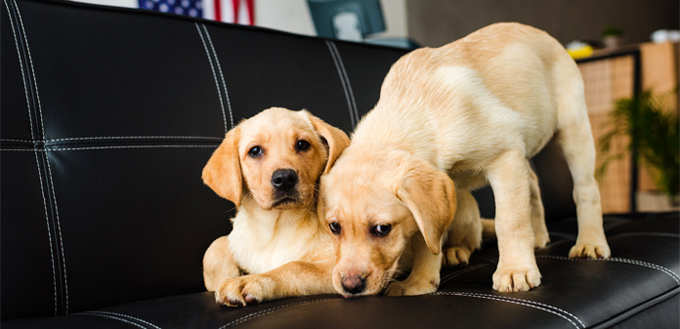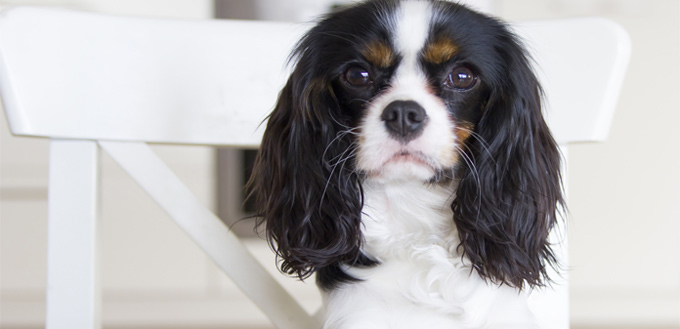Just like with humans dogs with hiccups are quite cute, but why does it happen, how can you help your dog get over them, and when should you be concerned that the hiccups could be pointing to an underlying condition?
Dogs don’t seem to be overly distressed by hiccups (unlike being sick or being generally unwell), so you may feel that there’s no real need for you to do anything if your dog is getting them. It is worth bearing in mind though that there are things you can do to make sure that your dog doesn’t get hiccups as a regular occurrence.

The Science Of Hiccups
Hiccups are a convulsion of the diaphragm, that muscle in your, and your dog’s, chest that helps with breathing.
As your dog breathes in, the diaphragm moves down making more room in the chest cavity for the lungs to expand. As your dog breathes out, the diaphragm relaxes and moves up into the chest cavity. A sudden spasm of the muscle and your dog will hiccup.
Hiccups are more likely to occur in puppies, where their muscles and organs are immature and they are super-energetic and excitable, but they can happen to a dog at any age.
Some Of The Causes Or Hiccups
The causes are much the same as in humans. Generally speaking, keeping the environment a life in general clean, healthy and not too exciting or stressful for your dog will help to ensure that they don’t get hiccups too often.
- Eating and/or drinking too quickly
- Swallowing too much air
In both of these cases, encouraging your dog to eat and drink slowly will help, possibly by introducing a puzzle ball to make him work for his food that will be slowly released as he knocks the ball around.
If you have more than one dog you may find it helpful to feed them in different rooms so they don’t feel the need to eat quickly before one of the others can eat all the food.
Related Post: Dog Puzzle Toys

Make sure that your dog is drinking regularly so that he’s not getting overly thirsty (especially in hot weather or if you’re playing hard) so that he’s not trying to quickly quench a thirst.
- Being over-excited or stressed
- Energetic play/activity
Try and keep your dog’s life on an even footing and not to get him too excited or distressed, give plenty of breaks when playing/exercising him, so that he has time to cool down and calm down between bouts of exercise.
- Inhaling something that irritates your lungs/throat
Keeping your house and his bedding/toys clean and keeping perfumes, candles, flowers, and smoking close to him to a minimum will cut down on
- Rapid breathing (caused by over-exertion, excitement, fear, etc)
Treatment
-
- Give your dog some sweet liquid to distract and calm him. Don’t give him anything solid, as chewing whilst breathing rapidly could cause choking. Also, don’t give your dog anything marketed as ‘sugar-free’, as these things often contain xylitol as the sugar substitute and this is dangerous to dogs. Xylitol can cause low blood sugar, seizures, liver failure, and even death when a dog eats even a tiny amount, so it is best avoided when your beloved pet is around.
- Gently massage your dog’s chest to see if you can relax his diaphragm.
- You could try gently startling your dog, but be careful that you don’t frighten him too much and cause him to lash out you or anyone/thing nearby.
- Light exercise will also distract your dog and give him the chance to change his breathing, which can cure the hiccups.
When To Seek Veterinary Advice
Most of the time, just like in humans, a dog with hiccups is nothing to be concerned about, but if the bout goes on for more than a couple of hours, you should take your dog to the vet to get checked out as prolonged hiccups can be a sign of conditions such as:
- pneumonia
- asthma
- pericarditis (an inflammation of the sac surrounding the heart)
- heatstroke
And will need checking out and treatment.
Hiccups are mostly nothing to worry about but can be prevented by helping your dog to slow down when eating and drinking, by not getting overly excited or stressed and by ensuring that he has time to calm down and recover between periods of activity. If you are concerned at all that your dog seems to be getting hiccups more than usual or they’re lasting a long time take him along to your vet to discount any underlying medical condition.
Sources:
- Helen Anne Travis, Dog Hiccups: What You Need to Know, PetMD
- Dr. Ahna Brutlag, Xylitol Toxicity in Dogs, VCA
Note: The advice provided in this post is intended for informational purposes and does not constitute medical advice regarding pets. For an accurate diagnosis of your pet's condition, please make an appointment with your vet.







